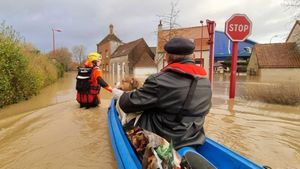On January 26, 2025, Belarus is holding its presidential elections, marking a significant event for the nation. With more than 5,000 polling stations opening at 8:00 am, the sound of the national anthem set the tone for the day as citizens began casting their votes.
The first polling station was located at the Belarusian State University of Physical Culture, where President Alexander Lukashenko traditionally votes. Mikhail Lebedinsky, head of the Leningrad Oblast Election Commission, is present as an international observer to monitor the electoral process. Along with Maxim Meiksin, chairman of the St. Petersburg Election Commission, they held meetings with Igor Karpenko, head of the Central Election Commission of Belarus.
During their visit, Karpenko announced attendance figures, stating, "Over the first five days of early voting, 41.81% of voters participated, and by 10 am on election day, we had already reached 47.5% turnout. This indicates significant interest among voters."
The atmosphere at polling stations has been described as warm and solemn, with Lebedinsky emphasizing the role of comprehensive information campaigns carried out by Belarusian election commissions. He remarked, "Previous days of early voting show there is significant interest in the elections. Citizens are actively going to polling stations, where the atmosphere is both warm and solemn. This high engagement is likely due to the importance of the event and the extensive informational work conducted by Belarus’s election commissions."
Observing these elections is not just limited to Russian representatives. Mohsen Eslami, the head of Iran’s election management, is also present, having been invited by Belarusian authorities. Eslami's team, comprising international observers from Iran, aims to learn from and engage with the electoral process here. Their experience from conducting over 42 elections since the Islamic Revolution adds another layer of international scrutiny to the Belarusian elections.
This election offers Belarusian citizens the chance to express their preferences at the polls; the early voter turnout appears to indicate heightened public interest. Election officials are closely monitoring the voting process, and inquiry lines have been established to address any questions from the public. Every detail is being observed, showcasing the significance of these elections for the country's political climate.
With over 5,000 polling stations operating, the turnout is expected to continue rising as the day progresses. Both domestic and international observers remain vigilant, ensuring transparency and fairness, which are particularly noteworthy amid Belarus's complex political backdrop. The electoral commission's commitment to openness suggests this election is more than merely procedural; it symbolizes Belarus's engagement with both its citizens and the international community.
Overall, as voters make their way to polling places across the nation, the presence of both local and international observers underlines the importance of the electoral process, indicating to the public and the world alike the high stakes involved. Will this election mark a turning point for Belarus, or will it reaffirm existing sentiments within the political establishment?
Only time will tell, but for now, the focus remains squarely on the booths, ballots, and the voices of the people.



